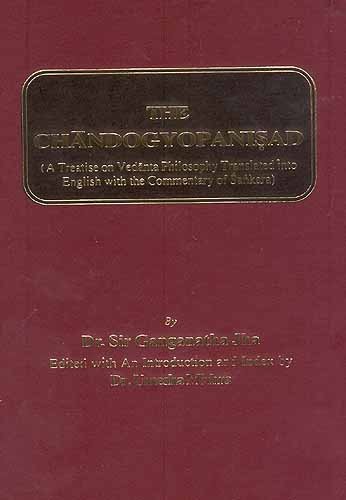Chandogya Upanishad (Shankara Bhashya)
by Ganganatha Jha | 1942 | 149,749 words | ISBN-10: 8170842840 | ISBN-13: 9788170842842
This is the English translation of the Chandogya Upanishad, an ancient philosophical text originally written in Sanksrit and dating to at least the 8th century BCE. Having eight chapters (adhyayas) and many sub-sections (khandas), this text is counted among the largest of it's kind. The Chandogya Upanishad, being connected to the Samaveda, represen...
Section 2.13 (thirteenth khaṇḍa) (two texts)
Upaniṣad text:
Approaching is the syllable ‘Hiṃ’; Fascinating is the Prastāva; Sleeping with the woman is the Udgītha; Lying down with the woman is the Pratihāra; the Passing of the Time is the Nidhana; the going to the End is the Nidhana.—This is the Vāmadevya interwoven in the couple.—(1)
Commentary (Śaṅkara Bhāṣya):
Approaching—when the man makes the assignation,—is the syllable ‘Hiṃ’; as both are the first steps in their processes.—Fascinating—winning over—is the Prastāva.—Sleeping—going to the same bed—is the Udgītha; because of importance.—The lying down with the woman—face to face,—is the Pratihāra.—The Passing of the time,—the actual process—and going to the end—completion of the act—is the Nidhana:—This is the Vāmadevya (Sāma) interwoven with the couple;—inasmuch as it is related to the couple consisting of Air and Water (out of which the Vāmadevya Sāma was produced).—(1)
Upaniṣad text:
One who thus knows the Vāmadevya as interwoven in the couple becomes companionated, goes on from coupling to coupling, attains the full span of life, lives gloriously, becomes great in offspring and cattle, great in fame. His observance is that ‘he should not avoid any woman.’—(2)
Commentary (Śaṅkara Bhāṣya):
One who knows etc.—as before.—Becomes companionated,—i.e., he never feels depressed,—goes on from coupling to coupling,—this indicates the infallibility of his virility.—He should not avoid any woman,—who has come to his bed, seeking intercourse. As such conduct has been enjoined here in connection with the meditation of the Vāmadevya Sāma,—the Smṛti rules forbiding such intercourse should be taken as applying to occasions other than this particular one. Inasmuch as all notions of right or wrong are based upon scriptural texts,—there is no incompatibility—between the present text and the text forbiding such intercourse.—(2)
End of Section (13) of Discourse II
